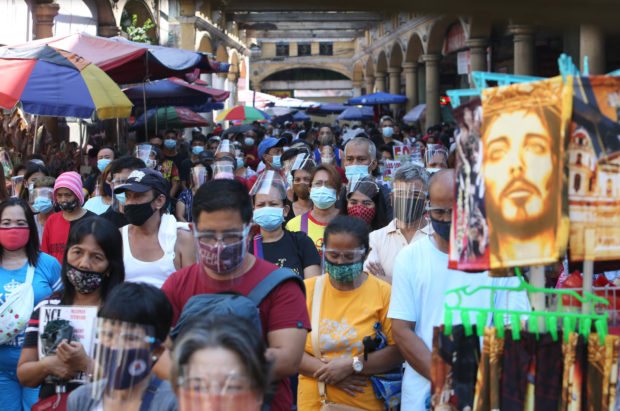
FIRST FRIDAY — People gather outside the Quiapo church in Manila for the first Friday mass of September back in 2020, when the government allowed religious activities to resume under the GCQ but only up to 10 percent of the church’s capacity.
INQUIRER file photo / MARIANNE BERMUDEZ
MANILA, Philippines — Religious gatherings are also mass gatherings, an official of the Department of Trade and Industry (DTI) said Tuesday, in response to a Catholic bishop’s criticism of the government’s decision to close down churches during the Holy Week.
“Number one, of course, kasi (it’s because) IATF Resolution No. 104 prohibited public gatherings, mass gatherings, and going to church, hearing Mass, is considered a mass gathering,” DTI Undersecretary Ruth Castelo said in an online media forum hosted by the Department of Health.
Castelo was being asked about the comment of outspoken Caloocan Bishop Pablo Virgilio David criticizing the government’s decision to ban mass gatherings, including those for religious purposes, in Metro Manila and nearby provinces of Bulacan, Cavite, Laguna and Rizal during the implementation of the GCQ bubble from March 22 to April 4.
“In spite of our adherence to strict protocol you lock down our churches during the holiest time of the year and allow 70 percent capacity in fitness centers and 50 percent in establishments for personal care services, including spas?!!! All right. May God have mercy on your souls!” David said in all capital letters in his Facebook post on Monday
He added he was hoping that the government would allow churches to operate with at least 20 to 30 percent of its capacity.
But on Tuesday, presidential spokesperson Harry Roque said that gyms, spas and internet cafes in Metro Manila will also remain closed in the next two weeks after local executives of the capital region rejected the reopening of these businesses.
Castelo pointed out that while physical distancing can also be practiced in church buildings, other activities inside these facilities, such as singing, involve the use of saliva.
“Doon sa simbahan, especially if it is an enclosed area—lahat naman ng simbahan enclosed—yes, you can observe physical distancing pero when you start singing diba… may saliva involved so marirelease mo ‘yun and you don’t know what is going to happen kung saan pupunta the droplets that you will release,” she said.
(In churches, especially if it is an enclosed area—all churches are enclosed anyway—yes, you can observe physical distancing but when you start singing… there is saliva involved so you will release that and you don’t know what is going to happen to the droplets you will release.)
Castelo said the government respects the opinion of churches but appealed that religious rites for the observance of the Holy Week be practiced at home instead.
“This is not whimsical, definitely. This is for the good of everybody,” she said.
“So as a religious organization, I think that they will also support this move kasi it’s for the general welfare. Kung ‘yun po ang intention ng religious groups natin (If that is the intention of our religious groups), this is one way of showing that they also help us in promoting general welfare,” she added.
RELATED STORIES:
Gyms, spas allowed at limited capacity in GCQ bubble — Palace
FAQs: What’s a GCQ bubble?